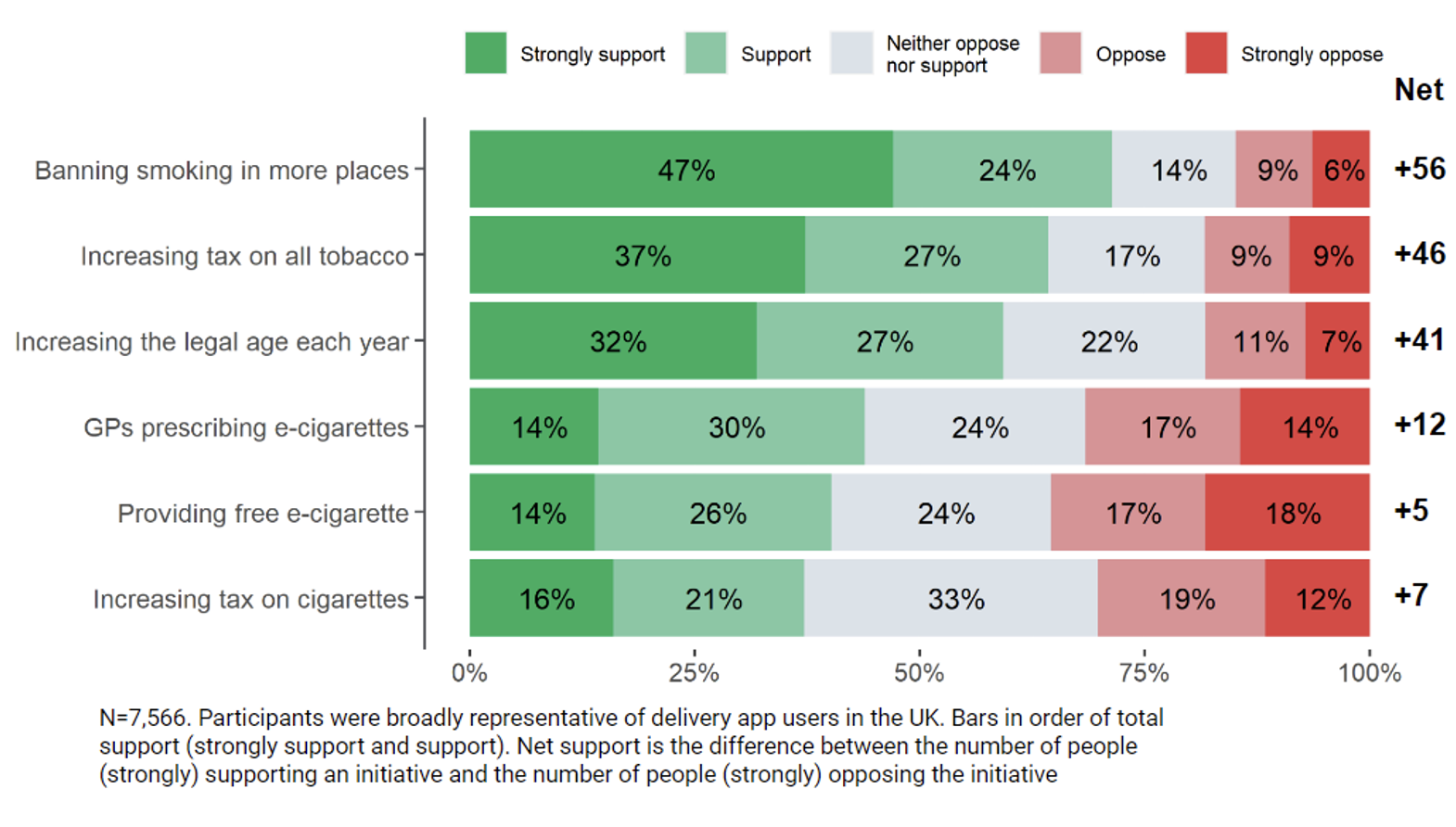Smoking is the leading cause of preventable illness and premature death. In England, smoking killed 74,600 people in 2019 alone. England and Wales have committed to being ‘smoke-free’ by 2030, and Scotland is aiming for 2034.
However, based on current trends, England will miss this target by at least seven years and Scotland by 16 years. It is clear that we need to do more and that progress has been too slow. Public opposition is often cited as a barrier to bold action, but it is unclear whether these concerns are grounded in reality.
We asked 7,566 people living in the UK to indicate whether they would support the introduction of radical smoking cessation policies. (The smoking status of participants was unknown. Participants were all online delivery app users, representative of the UK general population. This study was conducted online between 22 August 2022 and 11 September 2022).
The policies we asked about in our study included some of the options discussed last year in the Khan review, an independent review from looking into UK government’s tobacco control policy options. The policies we asked about were:
- Banning smoking in hospitality, hospital grounds, and outdoor public spaces
- Increasing tax on all forms of tobacco, including rolling tobacco
- Increasing the legal age of the sale of tobacco from 18 by one year, every year
- GPs prescribing e-cigarettes (vapes) to those trying to quit smoking
- Increasing tax on cigarettes, but not on rolling tobacco
- Providing free e-cigarette (vapes) starter packs to smokers in deprived communities
Participants rated their views on a 5-point scale, ranging from ‘strongly support’ to ‘strongly oppose’.
What did we find?
In short, there is significant public appetite for bold policies to support smoking cessation in the UK. There was positive net support for all policies included in our study. Net support represents the difference between the number of people (strongly) supporting a policy and the number of people (strongly) opposing a policy. Net support ranged from 5% to 56%, suggesting that some policies had extremely high support whilst for other policies it might be important to further understand and address the public’s concerns before rolling them out.

The policies with the most support were:
- Banning smoking in hospitality, hospital grounds, and outdoor public spaces (net support: +56%)
- Increasing tax on all forms of tobacco, including rolling tobacco (net support: +46%)
- Increasing the legal age of sale of tobacco from 18 by one year, every year (net support: +41%)
What does this mean?
1. Tobacco is a good target for future tax levies
Rolling tobacco is currently taxed at a lower rate than other tobacco products, such as pre-rolled cigarettes. This difference means younger smokers and economically disadvantaged smokers in particular avoid the deterrent effects of highly-priced cigarettes, changing what they smoke, instead of how much they smoke.
We found strong support for amending this loophole amongst both low and high-income individuals. One UK study found up to £500 million a year could be raised by limiting profits and increasing taxes to close these industry loopholes, which according to the authors ‘would be approximately enough to fund, twice over, UK-wide anti-tobacco smuggling measures and smoking cessation services in England including the associated pharmacotherapies’.
2. There is support for banning tobacco smoking for the next generation
Only 8% strongly opposed the proposal to increase the legal smoking age each year, and there was net support of +41%. If introduced this year, this policy would effectively outlaw smoking for people born after 2005. Taking this approach would make Britain the second country in the world to take such a bold step and potentially prevent the tobacco industry from creating new generations of smokers in the UK.
While support for this measure increased with age (that is, older people supported the policy more than younger people), strong net support (+20%) was still seen among 18-24 year-olds, the youngest group we surveyed.
3. E-cigarettes are supported by the majority but remain controversial
The provision of e-cigarettes was the least popular proposal: 18% strongly opposed providing smokers with free e-cigarettes and 14% strongly opposed the idea of GPs prescribing e-cigarettes as a smoking cessation aid. Crucially, however, this policy is still supported by the majority.
Popular perceptions of e-cigarettes as harmful and addictive have grown in recent years. While it is important to accurately communicate the risks and unknowns about e-cigarettes, they are considered to be 95% safer when compared to tobacco smoking. For every 100 people who attempt to quit smoking, 10 will succeed using an e-cigarette with nicotine, whereas only 6 will manage on traditional nicotine replacement therapies, and just 4 succeed without any support. As such, highlighting their potential to help people quit smoking could increase popular support for these policy options.
4. Many people are undecided on what should be done to tackle smoking
We found that a large proportion of people had no strong opinions on the measures we proposed. Between 14% and 33% of participants said that they neither oppose nor support the measures. This represents a strong opportunity to increase support. The undecided are more open to engaging with information that could increase their support for these policies compared to those who have already made up their minds. This is a potential avenue for behavioural science-driven interventions to increase public support even further.
Time for progress
It has now been 15 years since the introduction of the 2007 ban on smoking in enclosed public spaces. At the time, this measure was seen as radical and faced strong opposition from business and pro-smoking lobbying groups, but now most people couldn’t imagine anything different. We need to take strong action to reduce smoking – perhaps the answer lies in ‘radical’ ideas. Our research adds to the findings that these proposals are strongly supported and less ‘radical’ than one might think.
The Behavioural Insights Team are excited to collaborate with partner organisations on smoking cessation and health policy. If you think we could work together to improve health and tackle health inequalities please contact us (or e-mail: filippo.bianchi@bi.team) and we would be delighted to arrange a meeting.









